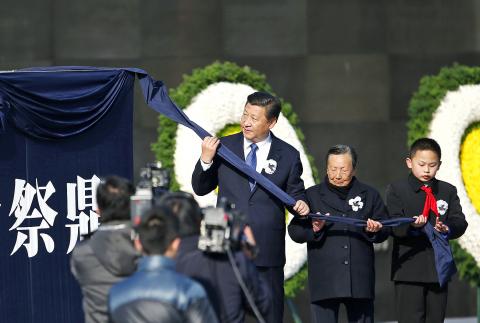Chinese President Xi Jinping (習近平) yesterday said that no one can deny the Nanjing Massacre, as China for the first time held a national day of remembrance for the Japanese military rampage that Beijing says killed 300,000 people.
State media estimated 10,000 people attended a ceremony in Nanjing to mark the 77th anniversary of the massacre, including aging survivors — some in their 90s — of the Japanese invasion of the eastern city on Dec. 13, 1937.
The crowd sang a boisterous rendition of China’s national anthem at the ceremony broadcast live on CCTV state television, followed by a moment of silence, as a siren symbolizing grief blared and the Chinese flag flew at half-mast under clear skies.

Photo: Reuters
“Anyone who tries to deny the massacre will not be allowed by history, the souls of the 300,000 deceased victims, 1.3 billion Chinese people and all people loving peace and justice in the world,” Xi said in a speech at the ceremony, according to Xinhua news agency.
National People’s Congress head Zhang Dejiang (張德江) and Chinese Minister of Foreign Affairs Wang Yi (王毅) were among Chinese dignitaries who attended.
Before the ceremony, CCTV showed black-and-white still and filmed images from the period, including scenes of Japanese soldiers occupying Nanjing and photographs of dead Chinese, some in the streets and some along a river bank.
Xi also appeared to hold out an olive branch to Japan, emphasizing the need for Chinese and Japanese to live in friendship, stressing that it was “militarists” who were responsible for the massacre.
“We should not bear hatred against an entire nation just because a small minority of militarists launched aggressive wars,” Xi said, according to Xinhua.
“The responsibilities for war crimes lie with a few militarists, but not the people,” he added, though also emphasized that “severe crimes committed by aggressors” cannot be forgotten.
Later, 3,000 doves symbolizing peace were released into the skies in memory of the victims, Xinhua said.
In February, China’s National People’s Congress, the country’s Communist Party-controlled legislature, made the anniversary of the Nanjing Massacre an official day of remembrance — along with Sept. 3 to mark the country’s victory against Japan in 1945 — as tensions with Japan over a maritime territorial dispute and rows over history intensified.
Japan and the People’s Republic of China established diplomatic relations in 1972, but ties have been strained by the row over uninhabited islands in the East China Sea and nationalist views and actions by Japanese politicians, including visits to Tokyo’s Yasukuni Shrine, which commemorates Japan’s war dead, including convicted war criminals from World War II.
However, last month, Xi and Japanese Prime Minister Shinzo Abe — who provoked China’s ire by visiting the shrine in December last year — held a strained first formal summit in Beijing on the sidelines of the annual APEC leaders’ meeting in a bid to improve bilateral relations.
The “Rape of Nanjing” is an exceptionally sensitive issue in the often-tense relations between Japan and China, with Beijing charging that Tokyo has failed to atone for the atrocity.

SECURITY: As China is ‘reshaping’ Hong Kong’s population, Taiwan must raise the eligibility threshold for applications from Hong Kongers, Chiu Chui-cheng said When Hong Kong and Macau citizens apply for residency in Taiwan, it would be under a new category that includes a “national security observation period,” Mainland Affairs Council (MAC) Minister Chiu Chui-cheng (邱垂正) said yesterday. President William Lai (賴清德) on March 13 announced 17 strategies to counter China’s aggression toward Taiwan, including incorporating national security considerations into the review process for residency applications from Hong Kong and Macau citizens. The situation in Hong Kong is constantly changing, Chiu said to media yesterday on the sidelines of the Taipei Technology Run hosted by the Taipei Neihu Technology Park Development Association. With

CARROT AND STICK: While unrelenting in its military threats, China attracted nearly 40,000 Taiwanese to over 400 business events last year Nearly 40,000 Taiwanese last year joined industry events in China, such as conferences and trade fairs, supported by the Chinese government, a study showed yesterday, as Beijing ramps up a charm offensive toward Taipei alongside military pressure. China has long taken a carrot-and-stick approach to Taiwan, threatening it with the prospect of military action while reaching out to those it believes are amenable to Beijing’s point of view. Taiwanese security officials are wary of what they see as Beijing’s influence campaigns to sway public opinion after Taipei and Beijing gradually resumed travel links halted by the COVID-19 pandemic, but the scale of

A US Marine Corps regiment equipped with Naval Strike Missiles (NSM) is set to participate in the upcoming Balikatan 25 exercise in the Luzon Strait, marking the system’s first-ever deployment in the Philippines. US and Philippine officials have separately confirmed that the Navy Marine Expeditionary Ship Interdiction System (NMESIS) — the mobile launch platform for the Naval Strike Missile — would take part in the joint exercise. The missiles are being deployed to “a strategic first island chain chokepoint” in the waters between Taiwan proper and the Philippines, US-based Naval News reported. “The Luzon Strait and Bashi Channel represent a critical access

Pope Francis is be laid to rest on Saturday after lying in state for three days in St Peter’s Basilica, where the faithful are expected to flock to pay their respects to history’s first Latin American pontiff. The cardinals met yesterday in the Vatican’s synod hall to chart the next steps before a conclave begins to choose Francis’ successor, as condolences poured in from around the world. According to current norms, the conclave must begin between May 5 and 10. The cardinals set the funeral for Saturday at 10am in St Peter’s Square, to be celebrated by the dean of the College